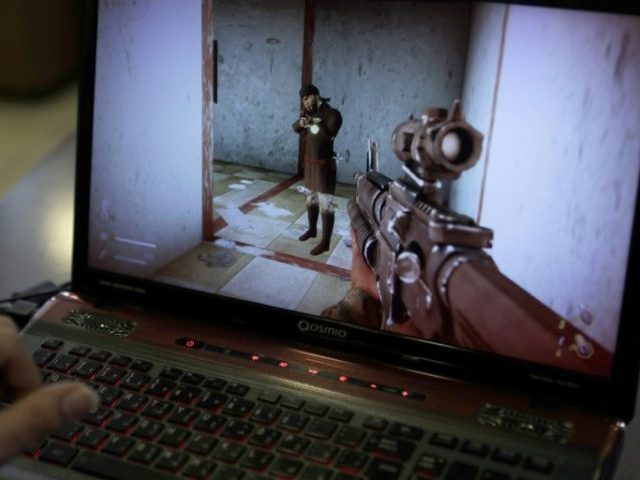President Trump reportedly showed a compilation of graphic scenes from modern video games to entertainment industry executives during a meeting about the effects of violent media on teenagers.
The Washington Examiner reports that during a closed-door meeting with a number of executives from video game studios, President Trump began the meeting by playing a compilation of “horrendously violent” scenes from video games to the group. Present at the meeting was Melissa Henson of the Parents Television Council, Dave Grossman, a retired U.S. Army lieutenant colonel who has long argued that video games cause violence in teens, Mike Gallagher, the CEO of the video game trade association Entertainment Software Association (ESA), video game developer ZeniMax Media CEO Robert Altman, Take-Two Interactive CEO Strauss Zelnick, Pat Vance, the President of the Entertainment Software Rating Board, Brent Bozell of the conservative Media Research Center, Sen. Marco Rubio, R-Fla., Rep. Vicky Hartzler, R-Mo., and Rep. Martha Roby, R-Ala.
The video that Trump played for the group has been posted to the official White House YouTube page. The Verge listed all of the scenes featured in the clip, they include,
- The death of Call of Duty: Black Ops character Joseph Bowman (2010)
- A collection of scenes from Call of Duty: Modern Warfare 2 (2009)
- Clips of kills in horror multiplayer game Dead by Daylight (2016)
- More scenes from Call of Duty: Modern Warfare 2, this time the infamous “No Russian” mission
- Killing Nazis in Wolfenstein: The New Order (2014)
- Shootouts in Fallout 4 (2015)
- The “X-ray kill cam” system in Sniper Elite 4 (2017)
- A death animation from horror game The Evil Within (2014)
The video can be seen above.
Grossman gave details on the meeting to the Washington Examiner: “President Trump said, ‘Did everyone see that clearly?'” Grossman said. “He played a video of a bunch of horrendously violent slashing games and then he turned to the industry representatives and said, ‘What are you going to say about this?'” The video game executives produced research showing that there was no link between violent video games and violent teens, which Grossman called “bogus.” When he’s not writing about the dangers of fictional video games, Grossman is a self-described “Killologist” who teaches military tactics to police officers and was most recently quoted telling officers “It’s your job to put a piece of steel in your fist and kill those sons of bitches when they come to kill our kids.”
Breitbart Tech has previously debunked the claim that video games cause violence. Recent studies have not shown any link between violent video games and violence in teens. Some studies have claimed that on-screen violence can create a desensitization effect, but so far have failed to show a corresponding drop in personal empathy towards others. A study in Frontiers in Psychology found no link, nor did a similar study in Brain Imaging and Behavior. According to a team of researchers at Oxford, online team-based video games can actually help to improve the sociability of children while in some cases actually reducing aggression.
President Trump reportedly asked each executive, “What do you think needs to be done?” Trump was apparently quite open-minded throughout the interview, “I don’t think he came in with his mind made up…. I think he was gathering information,” said Henson of the Parents Television Council. “He didn’t come in with an opening statement or a closing statement.”
The ESA released a statement on the meeting which states: “We welcomed the opportunity today to meet with the President and other elected officials at the White House. We discussed the numerous scientific studies establishing that there is no connection between video games and violence, First Amendment protection of video games, and how our industry’s rating system effectively helps parents make informed entertainment choices. We appreciate the President’s receptive and comprehensive approach to this discussion.”
Brent Bozell of the Media Research Center told the Verge, “I don’t think there should be any government control over it. But there is some programming that contains just absolute mind-boggling violence. We’ve all seen it. Is it appropriate in a civilized world to have that? Or could the industry listen to the better angels of their nature and say, we just don’t want to do it, on a voluntary basis?”
The White House also issued a statement which reads: “The President acknowledged some studies have indicated there is a correlation between video game violence and real violence. The conversation centered on whether violent video games, including games that graphically simulate killing, desensitize our community to violence.”
Breitbart News reporters Allum Bokhari and Charlie Nash wrote in their recent piece that there is no direct correlation between violent media and real-life violence:
Across society, there is no correlation between the rise of on-screen violence. There is considerably more violent media available today than there was in the mid-20th century when movies were tightly censored by the Hays Code, which prohibited gratuitous displays of bloodshed. Video games – violent and otherwise – are a new medium, only gaining traction in the late 70s and 1980s. Yet real-world violence in the developed world has declined across the same period.
The American Psychological Association (APA) categorizes violent video games as a risk factor in causing aggression but found no evidence linking them to acts of real-world criminality or delinquency. Aggression, which is also caused by competitive sports, is not sufficient to lead to real-world violence. In 2017, the Media Psychology and Technology division of the APA has advised public officials and journalists against attempts to link violent media to acts of real-world violence.
Read their full fact-checking article here.

COMMENTS
Please let us know if you're having issues with commenting.